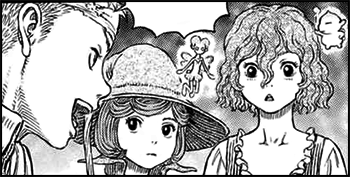@Robby:
Theres a large difference between telling Harry specifically "Okay, you are totally going to have to commit suicide at some point"
and
"Voldemort has a specific interest in you and there are reasons we can't tell you things. I'm treating you like an adult right now. It's not that you are untrustworthy, you have more than proven your worth, and we don't want to exclude you, but your scar and the method of his resurrection may have complications. I promise to tell you more later once we are clearer on things."
Harry might have still moped about it, but maybe he wouldn't have run right off into traps or brooded about it for all of, oh, books 5, 6 and 7.
! In book 5, what caused the events was Harry blindly believing and trusting what he saw through his connection to Voldemort. And Harry found out, in the early to middle parts of the book that, through their connection, he could see into Voldemort and he knew that it was possible that Voldemort could also use that connection to his advantage, possessing him (after hearing the adults talking). He founds out about that and he immediately thinks that Voldemort's goal was him and that he was the "weapon" Voldemort wanted. After that he knows that Dumbledore wants him to learn occlumency to diminish that connection because, like Hermione keeps telling him, it's dangerous. Does all of this stop him from still trusting what he sees with the connection at the end of the book and acting on it? No.
! So, no, frankly, telling him what you quoted wouldn't change anything. Harry knew a lot more than just that Voldemort had an interest in him and that didn't stop him. What could perhaps stop it would be telling Harry everything about the prophesy and even that might not have stopped Harry's impulsiveness, and anyway I already explained the reasons why Dumbledore didn't tell him about the prophesy. And whatever reservations Harry could have had regarding Dumbledore and the others in book 5 due to their secrets, in book 6 Dumbledore went out of his way to give special treatment to Harry, and exclusive knowledge into Voldemort than nobody else knew, so there's no cause in there for Harry having second thoughts about being trusted and so on.
Similarly. "Getting that memory from Slughorn is important" is NOT the same as "Getting that memory from Slughorn is a literally matter of life and death, and you need to put as much attention as you can on this task." You say one thing, Harry procrastinates a year. You say the other, he gets it done about 2 hours later. WHich… is exactly what happened in the book.
! What Dumbledore said to Harry: ""And so, for the first time, I am giving you homework, Harry. It will be your job to persuade Professor Slughorn to divulge the real memory, which will undoubtedly be our most crucial piece of information of all." And after that, when Harry still hadn't done so, Dumbledore says this to him: "I thought I made it clear to you how very important that memory is. Indeed, I did my best to impress upon you that it is the most crucial memory of all and that we will be wasting our time without it". To which Harry admits his guilt: "Professor Dumbledore, I'm really sorry. I should have done more. … I should have realized you wouldn't have asked me to do it if it wasn't really important".
! Harry knew that those sessions were important to fight Voldemort because Dumbledore had made it clear. Harry knew that fighting Voldemort was a matter of life and death, especially considering the prophesy regarding himself and Voldemort. Harry knew that the information that Slughorn had was not only crucial to those sessions, but the "most crucial piece of information of all" because that's exactly what Dumbledore told him. So, once again, that can't be blamed on Harry not having enough information.
Similarly, with Snape. "I trust him implicitly." is not the same as "I trust him implicitly due to a private matter, but I promised not to ever talk about it." One shows naive overconfidence in someone, the other shows that, well, at least there's a good reason.
Sure, there are reasons you can't tell Harry everything, and he IS young, but an extra sentence or two really goes a long way towards avoiding getting people killed.
! As is stated in the books: Tonks: "But Dumbledore swore he was on our side! I always thought Dumbledore must know something about Snape that we didn’t…"; McGonagall: “He always hinted that he had an ironclad reason for trusting Snape… Dumbledore told me explicitly that Snape’s repentance was absolutely genuine.”.
! Harry also knew this because Dumbledore pretty much had told him basically the same more than once and guaranteed to Harry that he trusted Snape. What did your quote add in terms of info? That it was a reason personal in nature and that he had promised? How would that change things? How would knowing that Dumbledore doesn't talk about it much because he promised and that it's personal, would satisfy Harry when he confronts Dumbledore about Snape being the one who leaked the info that eventually got his parents killed in book 6? Even earlier than that, how would that relax Harry since it's virtually identical to what he already knew? That Dumbledore had reasons to trust Snape and reasons to not discuss it was something that everybody knew and/or assumed, including Harry. What you quoted wouldn't change things.
@Zp1:
The conclusion to the HP series was one of the bigger letdowns in fiction that I can remember. The startup of the series was amazing - an introduction to a vast world of magic, the main characters learning the basics, and the promise of very cool things to come. Unfortunately, there was no actual payoff to the series. The main characters never really grew in skill or knowledge to any considerable degree as things went on. Hermione was the closest for some of her nifty supporting magic, but Ron and Harry never really did anything impressive - ever. Which meant that the ending spell of the climax of the Voldemort fight was fucking Expelliarmus. In a rare moment of self awareness, even Lupin gave Harry shit for his lack of repertoire.
I'm not saying Harry needed to be a Dumbledore/Voldemort level god by the end of the series, but would have helped the series immensely if Harry/Ron got intermediate combat training at some point. Something to show off that they actually had improved significantly between book one and the finale at the very least.
! The books are about ordinary people in extraordinary circumstances being brave enough to stand up and face evil. It's not about skills and it never was. But, even still, it's quite obvious that they are much better wizards in book 7 than in book 1.













